Examining AI: Enhancing Life, Drawbacks, and Solutions for the Future
VerifiedAdded on 2023/06/11
|8
|2099
|299
Essay
AI Summary
This essay explores the concept of Artificial Intelligence (AI), its potential to enhance life in the 21st century, and the challenges it faces. It begins by defining AI and its goals, highlighting applications in security, aiding the handicapped, and remote exploration. The essay then delves into the skepticism and fear surrounding AI, discussing concerns about machines surpassing human intelligence and the difficulty of replicating human cognitive abilities. Finally, it addresses countermeasures being taken, such as brain research and promoting AI's positive aspects. The conclusion emphasizes AI's potential benefits in healthcare, innovation, and exploration, arguing that it will complement rather than replace human intelligence. Access more detailed information and related documents on Desklib, a platform offering study tools for students.
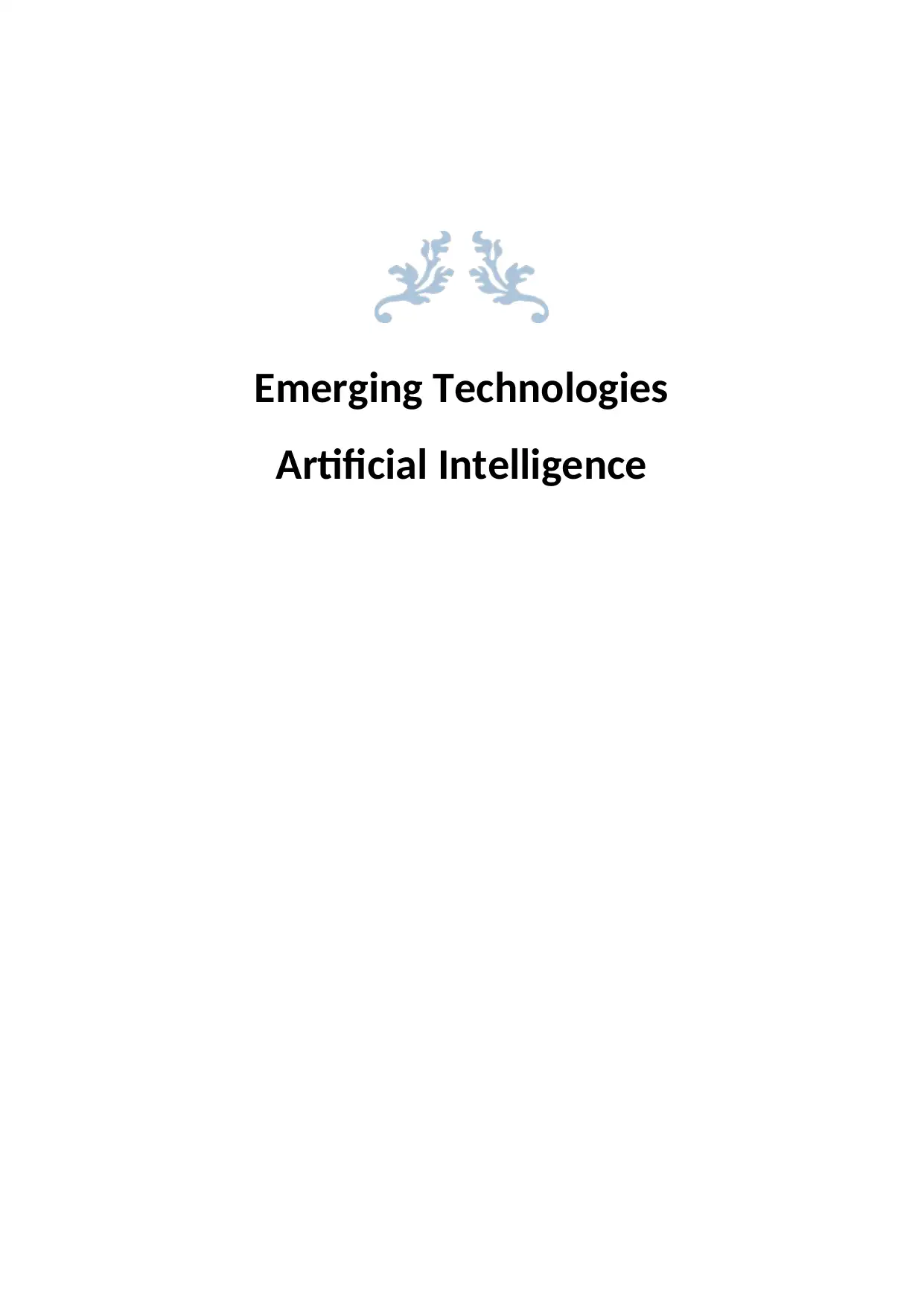
Emerging Technologies
Artificial Intelligence
Artificial Intelligence
Paraphrase This Document
Need a fresh take? Get an instant paraphrase of this document with our AI Paraphraser
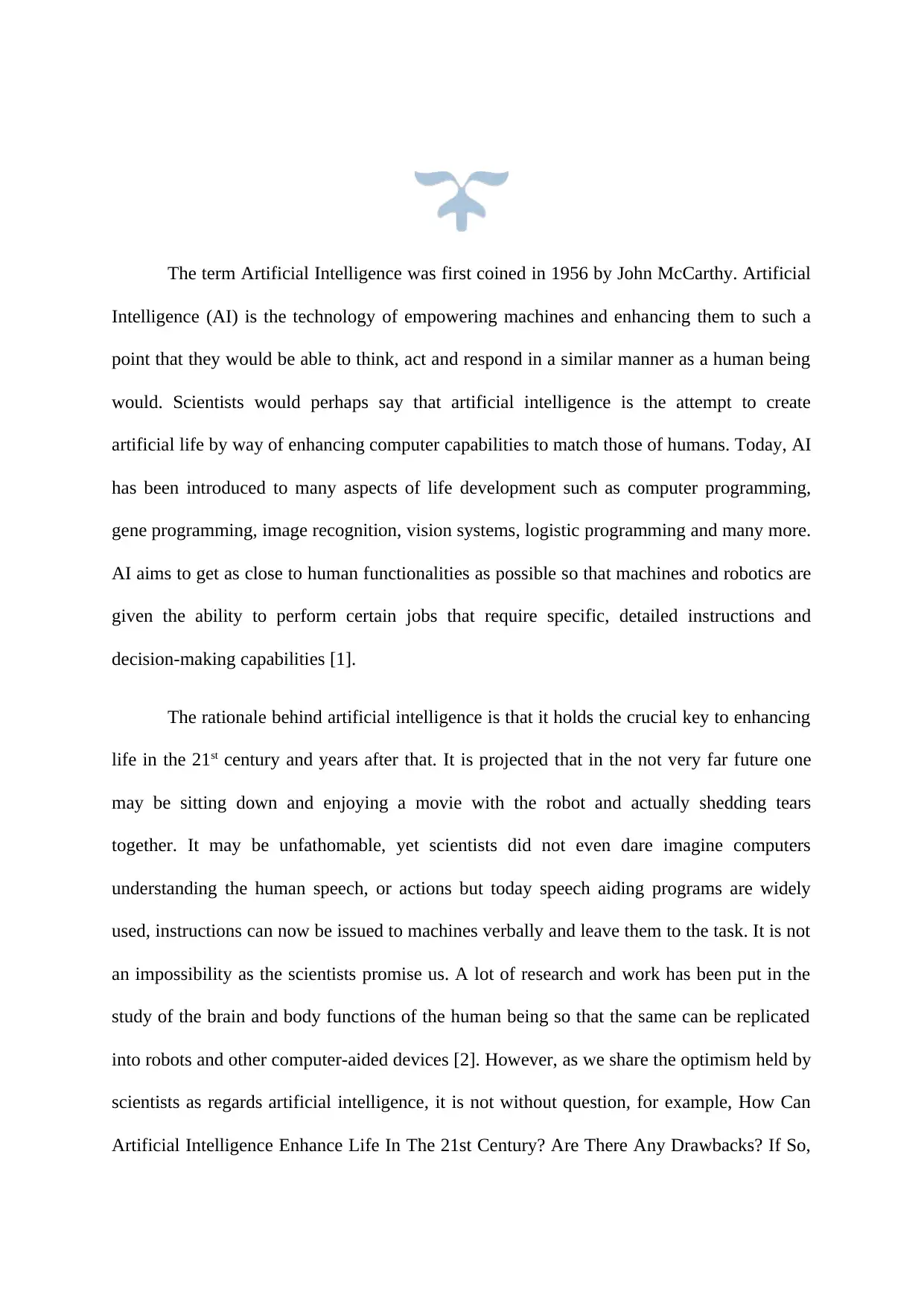
The term Artificial Intelligence was first coined in 1956 by John McCarthy. Artificial
Intelligence (AI) is the technology of empowering machines and enhancing them to such a
point that they would be able to think, act and respond in a similar manner as a human being
would. Scientists would perhaps say that artificial intelligence is the attempt to create
artificial life by way of enhancing computer capabilities to match those of humans. Today, AI
has been introduced to many aspects of life development such as computer programming,
gene programming, image recognition, vision systems, logistic programming and many more.
AI aims to get as close to human functionalities as possible so that machines and robotics are
given the ability to perform certain jobs that require specific, detailed instructions and
decision-making capabilities [1].
The rationale behind artificial intelligence is that it holds the crucial key to enhancing
life in the 21st century and years after that. It is projected that in the not very far future one
may be sitting down and enjoying a movie with the robot and actually shedding tears
together. It may be unfathomable, yet scientists did not even dare imagine computers
understanding the human speech, or actions but today speech aiding programs are widely
used, instructions can now be issued to machines verbally and leave them to the task. It is not
an impossibility as the scientists promise us. A lot of research and work has been put in the
study of the brain and body functions of the human being so that the same can be replicated
into robots and other computer-aided devices [2]. However, as we share the optimism held by
scientists as regards artificial intelligence, it is not without question, for example, How Can
Artificial Intelligence Enhance Life In The 21st Century? Are There Any Drawbacks? If So,
Intelligence (AI) is the technology of empowering machines and enhancing them to such a
point that they would be able to think, act and respond in a similar manner as a human being
would. Scientists would perhaps say that artificial intelligence is the attempt to create
artificial life by way of enhancing computer capabilities to match those of humans. Today, AI
has been introduced to many aspects of life development such as computer programming,
gene programming, image recognition, vision systems, logistic programming and many more.
AI aims to get as close to human functionalities as possible so that machines and robotics are
given the ability to perform certain jobs that require specific, detailed instructions and
decision-making capabilities [1].
The rationale behind artificial intelligence is that it holds the crucial key to enhancing
life in the 21st century and years after that. It is projected that in the not very far future one
may be sitting down and enjoying a movie with the robot and actually shedding tears
together. It may be unfathomable, yet scientists did not even dare imagine computers
understanding the human speech, or actions but today speech aiding programs are widely
used, instructions can now be issued to machines verbally and leave them to the task. It is not
an impossibility as the scientists promise us. A lot of research and work has been put in the
study of the brain and body functions of the human being so that the same can be replicated
into robots and other computer-aided devices [2]. However, as we share the optimism held by
scientists as regards artificial intelligence, it is not without question, for example, How Can
Artificial Intelligence Enhance Life In The 21st Century? Are There Any Drawbacks? If So,
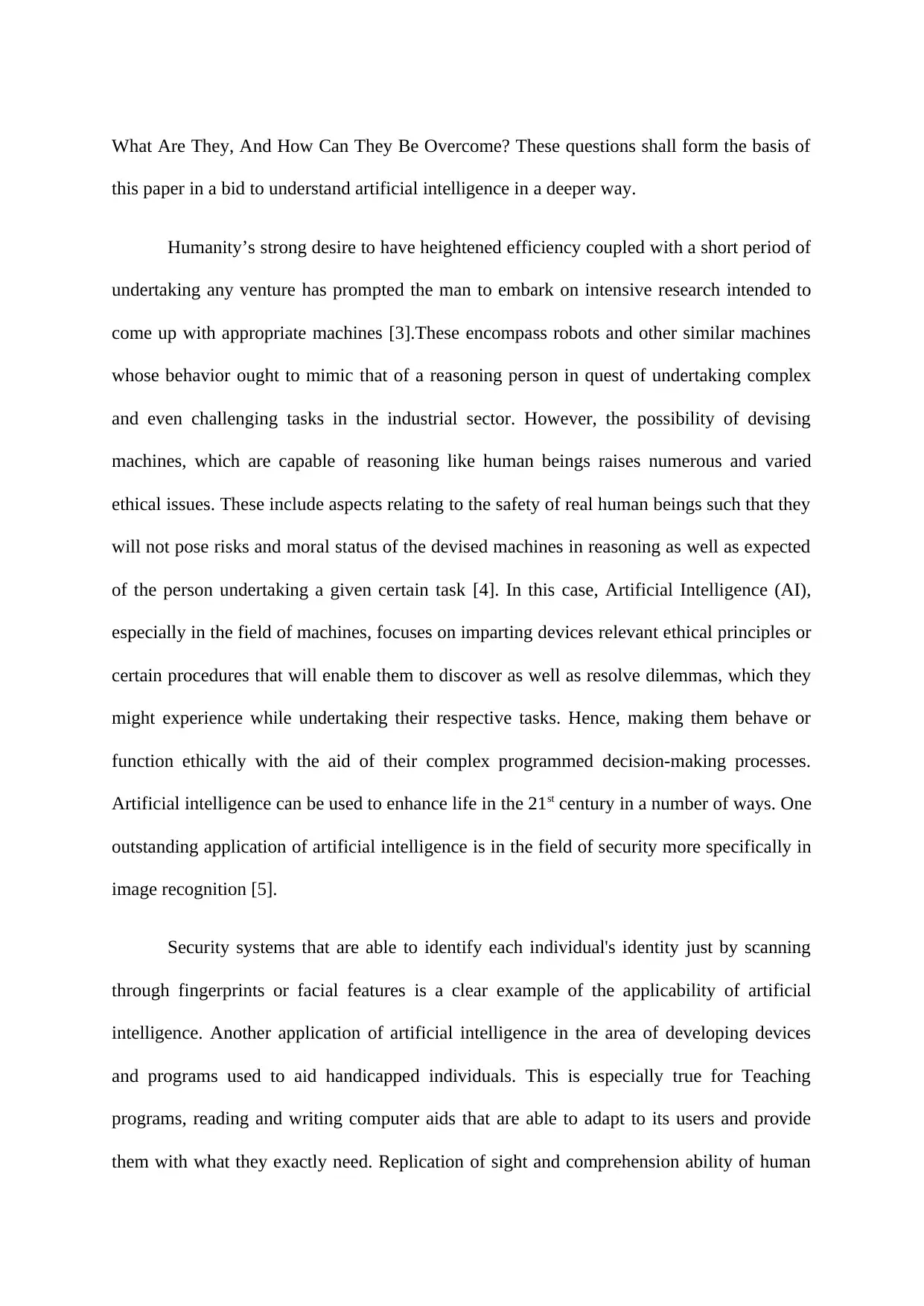
What Are They, And How Can They Be Overcome? These questions shall form the basis of
this paper in a bid to understand artificial intelligence in a deeper way.
Humanity’s strong desire to have heightened efficiency coupled with a short period of
undertaking any venture has prompted the man to embark on intensive research intended to
come up with appropriate machines [3].These encompass robots and other similar machines
whose behavior ought to mimic that of a reasoning person in quest of undertaking complex
and even challenging tasks in the industrial sector. However, the possibility of devising
machines, which are capable of reasoning like human beings raises numerous and varied
ethical issues. These include aspects relating to the safety of real human beings such that they
will not pose risks and moral status of the devised machines in reasoning as well as expected
of the person undertaking a given certain task [4]. In this case, Artificial Intelligence (AI),
especially in the field of machines, focuses on imparting devices relevant ethical principles or
certain procedures that will enable them to discover as well as resolve dilemmas, which they
might experience while undertaking their respective tasks. Hence, making them behave or
function ethically with the aid of their complex programmed decision-making processes.
Artificial intelligence can be used to enhance life in the 21st century in a number of ways. One
outstanding application of artificial intelligence is in the field of security more specifically in
image recognition [5].
Security systems that are able to identify each individual's identity just by scanning
through fingerprints or facial features is a clear example of the applicability of artificial
intelligence. Another application of artificial intelligence in the area of developing devices
and programs used to aid handicapped individuals. This is especially true for Teaching
programs, reading and writing computer aids that are able to adapt to its users and provide
them with what they exactly need. Replication of sight and comprehension ability of human
this paper in a bid to understand artificial intelligence in a deeper way.
Humanity’s strong desire to have heightened efficiency coupled with a short period of
undertaking any venture has prompted the man to embark on intensive research intended to
come up with appropriate machines [3].These encompass robots and other similar machines
whose behavior ought to mimic that of a reasoning person in quest of undertaking complex
and even challenging tasks in the industrial sector. However, the possibility of devising
machines, which are capable of reasoning like human beings raises numerous and varied
ethical issues. These include aspects relating to the safety of real human beings such that they
will not pose risks and moral status of the devised machines in reasoning as well as expected
of the person undertaking a given certain task [4]. In this case, Artificial Intelligence (AI),
especially in the field of machines, focuses on imparting devices relevant ethical principles or
certain procedures that will enable them to discover as well as resolve dilemmas, which they
might experience while undertaking their respective tasks. Hence, making them behave or
function ethically with the aid of their complex programmed decision-making processes.
Artificial intelligence can be used to enhance life in the 21st century in a number of ways. One
outstanding application of artificial intelligence is in the field of security more specifically in
image recognition [5].
Security systems that are able to identify each individual's identity just by scanning
through fingerprints or facial features is a clear example of the applicability of artificial
intelligence. Another application of artificial intelligence in the area of developing devices
and programs used to aid handicapped individuals. This is especially true for Teaching
programs, reading and writing computer aids that are able to adapt to its users and provide
them with what they exactly need. Replication of sight and comprehension ability of human
⊘ This is a preview!⊘
Do you want full access?
Subscribe today to unlock all pages.

Trusted by 1+ million students worldwide
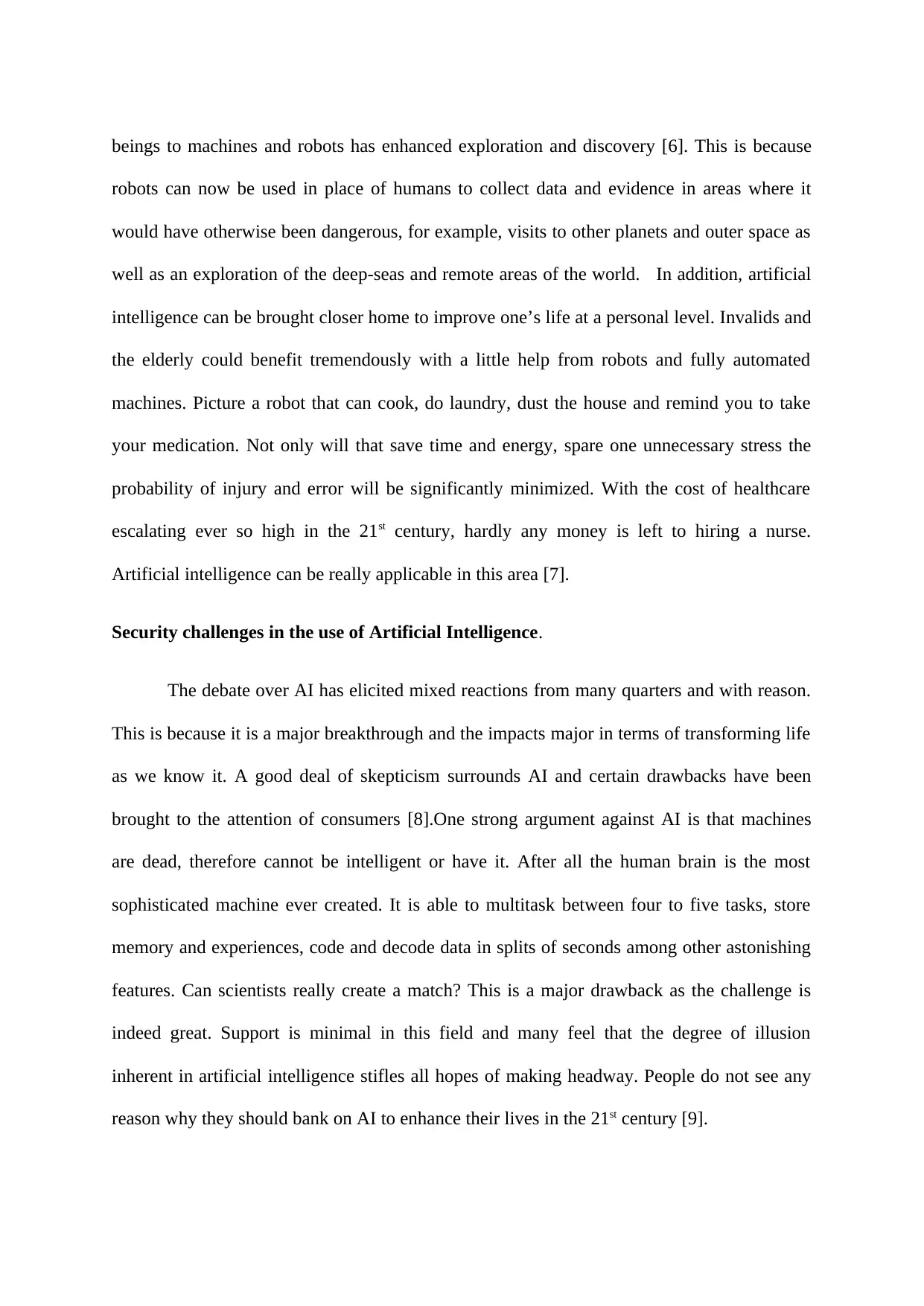
beings to machines and robots has enhanced exploration and discovery [6]. This is because
robots can now be used in place of humans to collect data and evidence in areas where it
would have otherwise been dangerous, for example, visits to other planets and outer space as
well as an exploration of the deep-seas and remote areas of the world. In addition, artificial
intelligence can be brought closer home to improve one’s life at a personal level. Invalids and
the elderly could benefit tremendously with a little help from robots and fully automated
machines. Picture a robot that can cook, do laundry, dust the house and remind you to take
your medication. Not only will that save time and energy, spare one unnecessary stress the
probability of injury and error will be significantly minimized. With the cost of healthcare
escalating ever so high in the 21st century, hardly any money is left to hiring a nurse.
Artificial intelligence can be really applicable in this area [7].
Security challenges in the use of Artificial Intelligence.
The debate over AI has elicited mixed reactions from many quarters and with reason.
This is because it is a major breakthrough and the impacts major in terms of transforming life
as we know it. A good deal of skepticism surrounds AI and certain drawbacks have been
brought to the attention of consumers [8].One strong argument against AI is that machines
are dead, therefore cannot be intelligent or have it. After all the human brain is the most
sophisticated machine ever created. It is able to multitask between four to five tasks, store
memory and experiences, code and decode data in splits of seconds among other astonishing
features. Can scientists really create a match? This is a major drawback as the challenge is
indeed great. Support is minimal in this field and many feel that the degree of illusion
inherent in artificial intelligence stifles all hopes of making headway. People do not see any
reason why they should bank on AI to enhance their lives in the 21st century [9].
robots can now be used in place of humans to collect data and evidence in areas where it
would have otherwise been dangerous, for example, visits to other planets and outer space as
well as an exploration of the deep-seas and remote areas of the world. In addition, artificial
intelligence can be brought closer home to improve one’s life at a personal level. Invalids and
the elderly could benefit tremendously with a little help from robots and fully automated
machines. Picture a robot that can cook, do laundry, dust the house and remind you to take
your medication. Not only will that save time and energy, spare one unnecessary stress the
probability of injury and error will be significantly minimized. With the cost of healthcare
escalating ever so high in the 21st century, hardly any money is left to hiring a nurse.
Artificial intelligence can be really applicable in this area [7].
Security challenges in the use of Artificial Intelligence.
The debate over AI has elicited mixed reactions from many quarters and with reason.
This is because it is a major breakthrough and the impacts major in terms of transforming life
as we know it. A good deal of skepticism surrounds AI and certain drawbacks have been
brought to the attention of consumers [8].One strong argument against AI is that machines
are dead, therefore cannot be intelligent or have it. After all the human brain is the most
sophisticated machine ever created. It is able to multitask between four to five tasks, store
memory and experiences, code and decode data in splits of seconds among other astonishing
features. Can scientists really create a match? This is a major drawback as the challenge is
indeed great. Support is minimal in this field and many feel that the degree of illusion
inherent in artificial intelligence stifles all hopes of making headway. People do not see any
reason why they should bank on AI to enhance their lives in the 21st century [9].
Paraphrase This Document
Need a fresh take? Get an instant paraphrase of this document with our AI Paraphraser
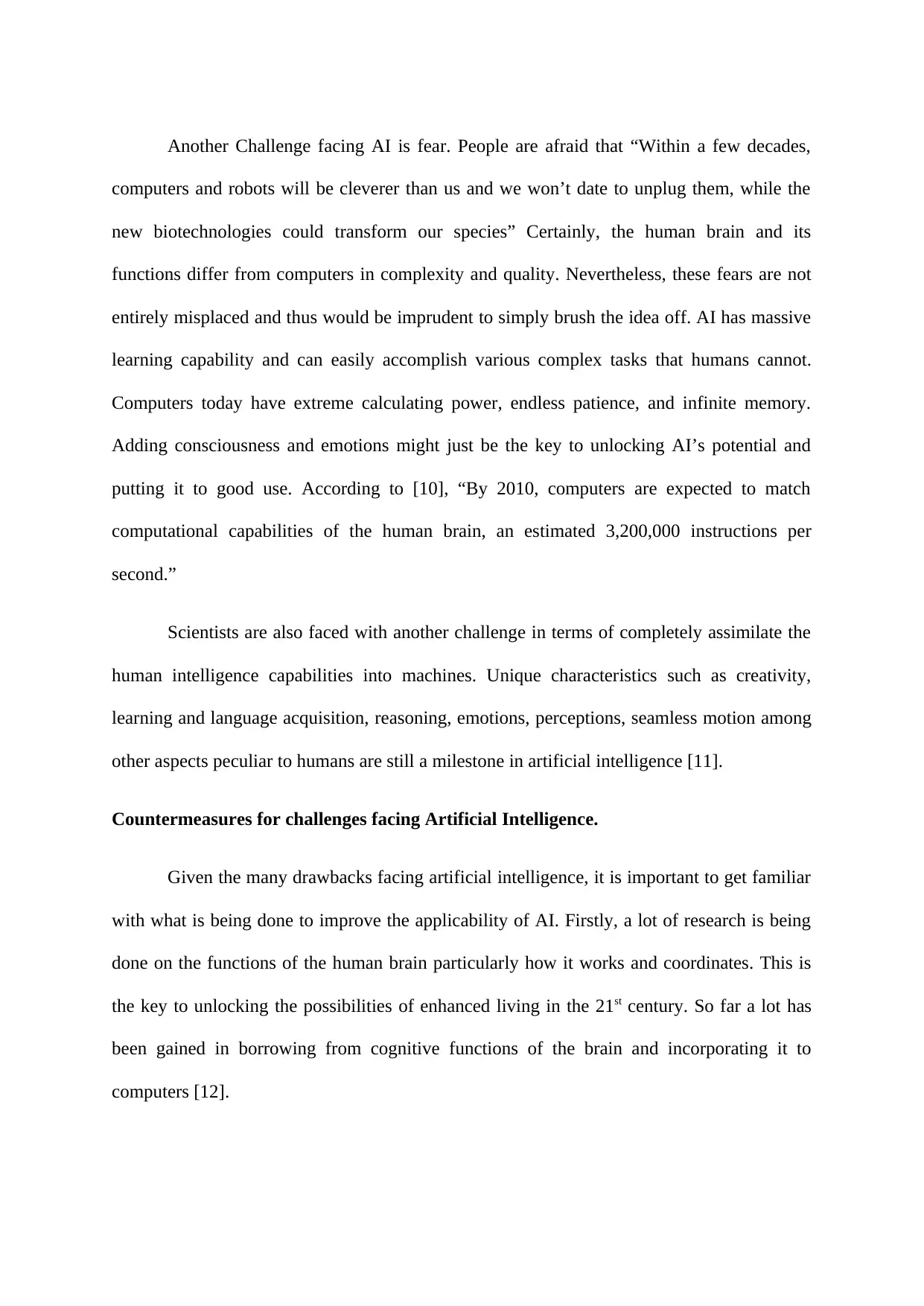
Another Challenge facing AI is fear. People are afraid that “Within a few decades,
computers and robots will be cleverer than us and we won’t date to unplug them, while the
new biotechnologies could transform our species” Certainly, the human brain and its
functions differ from computers in complexity and quality. Nevertheless, these fears are not
entirely misplaced and thus would be imprudent to simply brush the idea off. AI has massive
learning capability and can easily accomplish various complex tasks that humans cannot.
Computers today have extreme calculating power, endless patience, and infinite memory.
Adding consciousness and emotions might just be the key to unlocking AI’s potential and
putting it to good use. According to [10], “By 2010, computers are expected to match
computational capabilities of the human brain, an estimated 3,200,000 instructions per
second.”
Scientists are also faced with another challenge in terms of completely assimilate the
human intelligence capabilities into machines. Unique characteristics such as creativity,
learning and language acquisition, reasoning, emotions, perceptions, seamless motion among
other aspects peculiar to humans are still a milestone in artificial intelligence [11].
Countermeasures for challenges facing Artificial Intelligence.
Given the many drawbacks facing artificial intelligence, it is important to get familiar
with what is being done to improve the applicability of AI. Firstly, a lot of research is being
done on the functions of the human brain particularly how it works and coordinates. This is
the key to unlocking the possibilities of enhanced living in the 21st century. So far a lot has
been gained in borrowing from cognitive functions of the brain and incorporating it to
computers [12].
computers and robots will be cleverer than us and we won’t date to unplug them, while the
new biotechnologies could transform our species” Certainly, the human brain and its
functions differ from computers in complexity and quality. Nevertheless, these fears are not
entirely misplaced and thus would be imprudent to simply brush the idea off. AI has massive
learning capability and can easily accomplish various complex tasks that humans cannot.
Computers today have extreme calculating power, endless patience, and infinite memory.
Adding consciousness and emotions might just be the key to unlocking AI’s potential and
putting it to good use. According to [10], “By 2010, computers are expected to match
computational capabilities of the human brain, an estimated 3,200,000 instructions per
second.”
Scientists are also faced with another challenge in terms of completely assimilate the
human intelligence capabilities into machines. Unique characteristics such as creativity,
learning and language acquisition, reasoning, emotions, perceptions, seamless motion among
other aspects peculiar to humans are still a milestone in artificial intelligence [11].
Countermeasures for challenges facing Artificial Intelligence.
Given the many drawbacks facing artificial intelligence, it is important to get familiar
with what is being done to improve the applicability of AI. Firstly, a lot of research is being
done on the functions of the human brain particularly how it works and coordinates. This is
the key to unlocking the possibilities of enhanced living in the 21st century. So far a lot has
been gained in borrowing from cognitive functions of the brain and incorporating it to
computers [12].
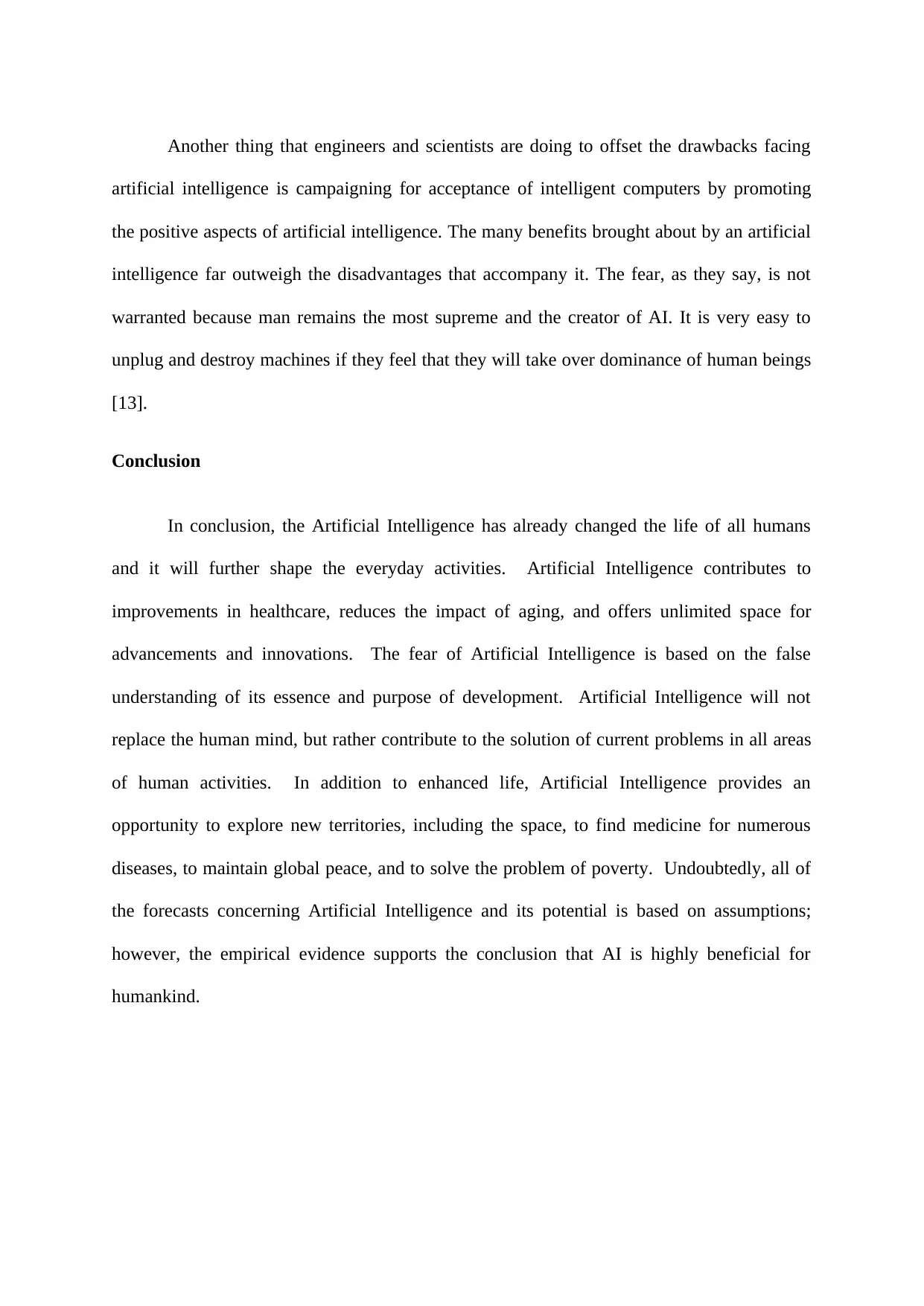
Another thing that engineers and scientists are doing to offset the drawbacks facing
artificial intelligence is campaigning for acceptance of intelligent computers by promoting
the positive aspects of artificial intelligence. The many benefits brought about by an artificial
intelligence far outweigh the disadvantages that accompany it. The fear, as they say, is not
warranted because man remains the most supreme and the creator of AI. It is very easy to
unplug and destroy machines if they feel that they will take over dominance of human beings
[13].
Conclusion
In conclusion, the Artificial Intelligence has already changed the life of all humans
and it will further shape the everyday activities. Artificial Intelligence contributes to
improvements in healthcare, reduces the impact of aging, and offers unlimited space for
advancements and innovations. The fear of Artificial Intelligence is based on the false
understanding of its essence and purpose of development. Artificial Intelligence will not
replace the human mind, but rather contribute to the solution of current problems in all areas
of human activities. In addition to enhanced life, Artificial Intelligence provides an
opportunity to explore new territories, including the space, to find medicine for numerous
diseases, to maintain global peace, and to solve the problem of poverty. Undoubtedly, all of
the forecasts concerning Artificial Intelligence and its potential is based on assumptions;
however, the empirical evidence supports the conclusion that AI is highly beneficial for
humankind.
artificial intelligence is campaigning for acceptance of intelligent computers by promoting
the positive aspects of artificial intelligence. The many benefits brought about by an artificial
intelligence far outweigh the disadvantages that accompany it. The fear, as they say, is not
warranted because man remains the most supreme and the creator of AI. It is very easy to
unplug and destroy machines if they feel that they will take over dominance of human beings
[13].
Conclusion
In conclusion, the Artificial Intelligence has already changed the life of all humans
and it will further shape the everyday activities. Artificial Intelligence contributes to
improvements in healthcare, reduces the impact of aging, and offers unlimited space for
advancements and innovations. The fear of Artificial Intelligence is based on the false
understanding of its essence and purpose of development. Artificial Intelligence will not
replace the human mind, but rather contribute to the solution of current problems in all areas
of human activities. In addition to enhanced life, Artificial Intelligence provides an
opportunity to explore new territories, including the space, to find medicine for numerous
diseases, to maintain global peace, and to solve the problem of poverty. Undoubtedly, all of
the forecasts concerning Artificial Intelligence and its potential is based on assumptions;
however, the empirical evidence supports the conclusion that AI is highly beneficial for
humankind.
⊘ This is a preview!⊘
Do you want full access?
Subscribe today to unlock all pages.

Trusted by 1+ million students worldwide
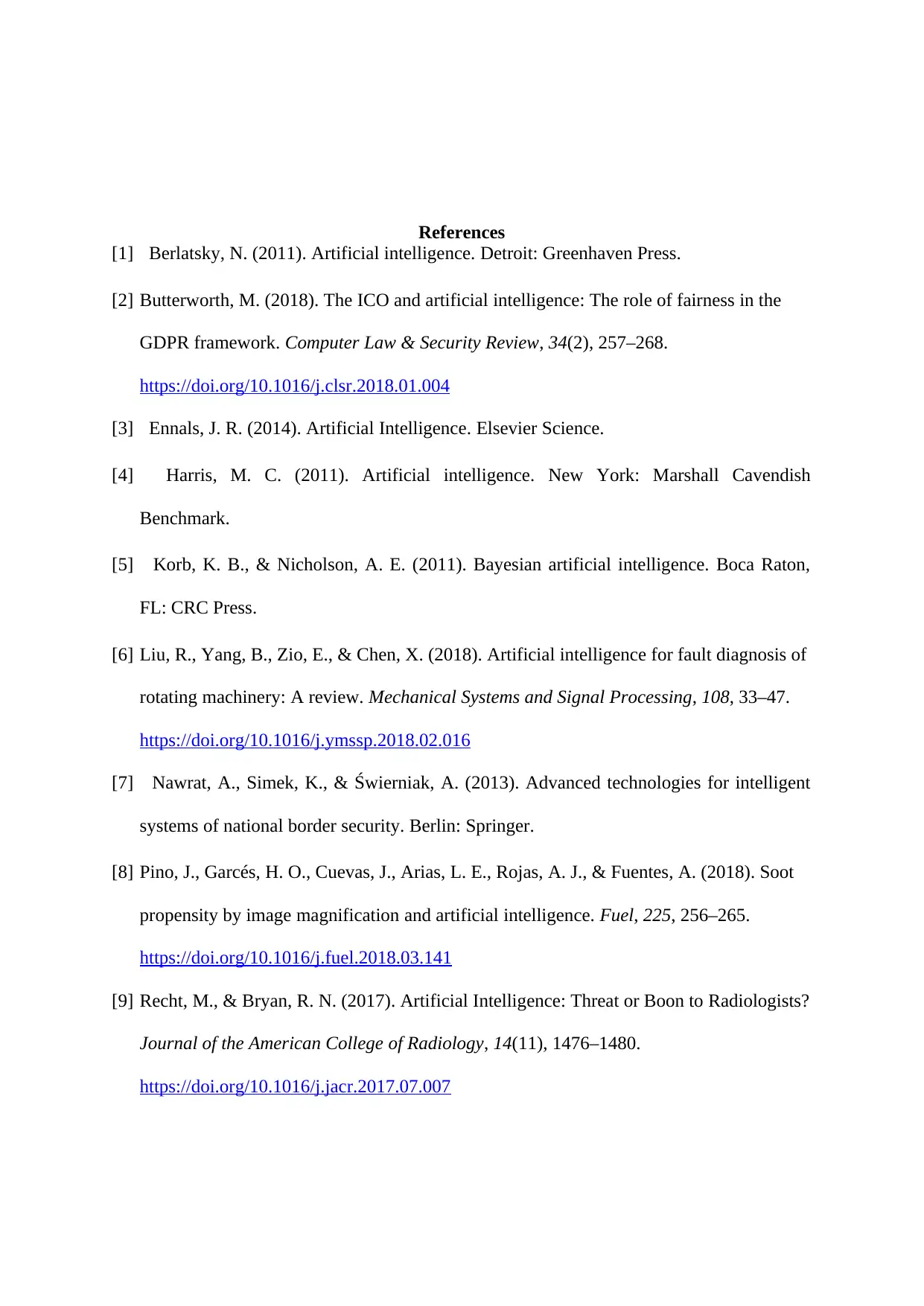
References
[1] Berlatsky, N. (2011). Artificial intelligence. Detroit: Greenhaven Press.
[2] Butterworth, M. (2018). The ICO and artificial intelligence: The role of fairness in the
GDPR framework. Computer Law & Security Review, 34(2), 257–268.
https://doi.org/10.1016/j.clsr.2018.01.004
[3] Ennals, J. R. (2014). Artificial Intelligence. Elsevier Science.
[4] Harris, M. C. (2011). Artificial intelligence. New York: Marshall Cavendish
Benchmark.
[5] Korb, K. B., & Nicholson, A. E. (2011). Bayesian artificial intelligence. Boca Raton,
FL: CRC Press.
[6] Liu, R., Yang, B., Zio, E., & Chen, X. (2018). Artificial intelligence for fault diagnosis of
rotating machinery: A review. Mechanical Systems and Signal Processing, 108, 33–47.
https://doi.org/10.1016/j.ymssp.2018.02.016
[7] Nawrat, A., Simek, K., & Ś wierniak, A. (2013). Advanced technologies for intelligent
systems of national border security. Berlin: Springer.
[8] Pino, J., Garcés, H. O., Cuevas, J., Arias, L. E., Rojas, A. J., & Fuentes, A. (2018). Soot
propensity by image magnification and artificial intelligence. Fuel, 225, 256–265.
https://doi.org/10.1016/j.fuel.2018.03.141
[9] Recht, M., & Bryan, R. N. (2017). Artificial Intelligence: Threat or Boon to Radiologists?
Journal of the American College of Radiology, 14(11), 1476–1480.
https://doi.org/10.1016/j.jacr.2017.07.007
[1] Berlatsky, N. (2011). Artificial intelligence. Detroit: Greenhaven Press.
[2] Butterworth, M. (2018). The ICO and artificial intelligence: The role of fairness in the
GDPR framework. Computer Law & Security Review, 34(2), 257–268.
https://doi.org/10.1016/j.clsr.2018.01.004
[3] Ennals, J. R. (2014). Artificial Intelligence. Elsevier Science.
[4] Harris, M. C. (2011). Artificial intelligence. New York: Marshall Cavendish
Benchmark.
[5] Korb, K. B., & Nicholson, A. E. (2011). Bayesian artificial intelligence. Boca Raton,
FL: CRC Press.
[6] Liu, R., Yang, B., Zio, E., & Chen, X. (2018). Artificial intelligence for fault diagnosis of
rotating machinery: A review. Mechanical Systems and Signal Processing, 108, 33–47.
https://doi.org/10.1016/j.ymssp.2018.02.016
[7] Nawrat, A., Simek, K., & Ś wierniak, A. (2013). Advanced technologies for intelligent
systems of national border security. Berlin: Springer.
[8] Pino, J., Garcés, H. O., Cuevas, J., Arias, L. E., Rojas, A. J., & Fuentes, A. (2018). Soot
propensity by image magnification and artificial intelligence. Fuel, 225, 256–265.
https://doi.org/10.1016/j.fuel.2018.03.141
[9] Recht, M., & Bryan, R. N. (2017). Artificial Intelligence: Threat or Boon to Radiologists?
Journal of the American College of Radiology, 14(11), 1476–1480.
https://doi.org/10.1016/j.jacr.2017.07.007
Paraphrase This Document
Need a fresh take? Get an instant paraphrase of this document with our AI Paraphraser
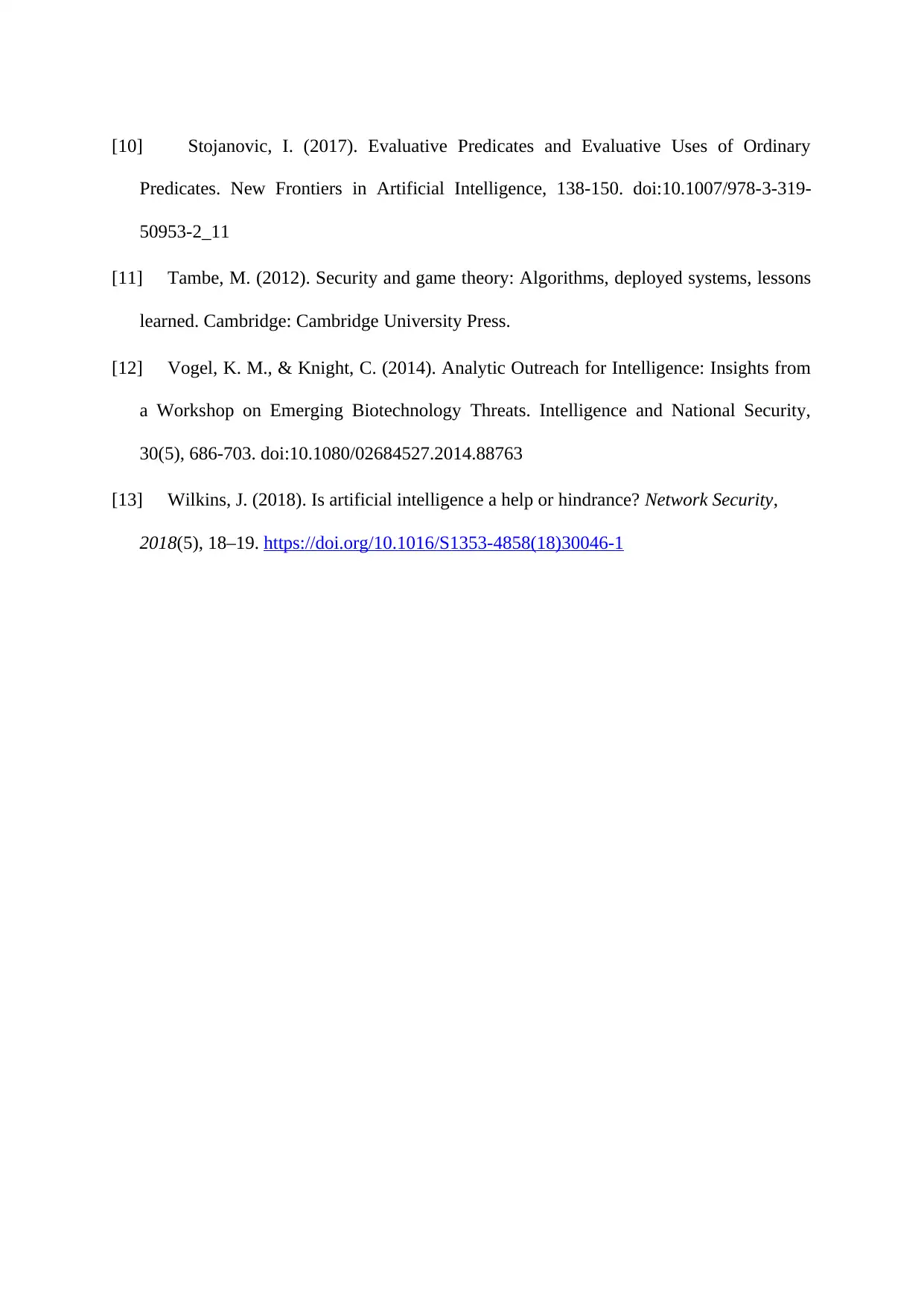
[10] Stojanovic, I. (2017). Evaluative Predicates and Evaluative Uses of Ordinary
Predicates. New Frontiers in Artificial Intelligence, 138-150. doi:10.1007/978-3-319-
50953-2_11
[11] Tambe, M. (2012). Security and game theory: Algorithms, deployed systems, lessons
learned. Cambridge: Cambridge University Press.
[12] Vogel, K. M., & Knight, C. (2014). Analytic Outreach for Intelligence: Insights from
a Workshop on Emerging Biotechnology Threats. Intelligence and National Security,
30(5), 686-703. doi:10.1080/02684527.2014.88763
[13] Wilkins, J. (2018). Is artificial intelligence a help or hindrance? Network Security,
2018(5), 18–19. https://doi.org/10.1016/S1353-4858(18)30046-1
Predicates. New Frontiers in Artificial Intelligence, 138-150. doi:10.1007/978-3-319-
50953-2_11
[11] Tambe, M. (2012). Security and game theory: Algorithms, deployed systems, lessons
learned. Cambridge: Cambridge University Press.
[12] Vogel, K. M., & Knight, C. (2014). Analytic Outreach for Intelligence: Insights from
a Workshop on Emerging Biotechnology Threats. Intelligence and National Security,
30(5), 686-703. doi:10.1080/02684527.2014.88763
[13] Wilkins, J. (2018). Is artificial intelligence a help or hindrance? Network Security,
2018(5), 18–19. https://doi.org/10.1016/S1353-4858(18)30046-1
1 out of 8
Related Documents
Your All-in-One AI-Powered Toolkit for Academic Success.
+13062052269
info@desklib.com
Available 24*7 on WhatsApp / Email
![[object Object]](/_next/static/media/star-bottom.7253800d.svg)
Unlock your academic potential
Copyright © 2020–2026 A2Z Services. All Rights Reserved. Developed and managed by ZUCOL.




